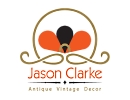Contact Seller
Jason Clarke Antiques
Tel07815 046645Please quote Antiques Atlas.


 Violin To Renovate Or For Display Purposes
Violin To Renovate Or For Display Purposes
 Fine Rosewood Duet Music Stand
Fine Rosewood Duet Music Stand
 Vintage Chinese Ceremonial Drum
Vintage Chinese Ceremonial Drum
 Antique Cello Case W E Hill Velvet Lined
Antique Cello Case W E Hill Velvet Lined
 Antique Marimbaphone
Antique Marimbaphone
 Henry Symondson Musical Handbell early 19th cent.
Henry Symondson Musical Handbell early 19th cent.
 French Violins 4/4 cased with 4 bows.
French Violins 4/4 cased with 4 bows.
 Victorian Cased Set of Handbells by Warners
Victorian Cased Set of Handbells by Warners
 BTH Bakelite Horn Loudspeaker, c1930
BTH Bakelite Horn Loudspeaker, c1930
 Large Painted Folk Art Drum
Large Painted Folk Art Drum
 Steiner Violin & Case German
Steiner Violin & Case German
 Jacob Stainer violin with signed bow by Model
Jacob Stainer violin with signed bow by Model
Non UK callers :
+44 7815 046645
Early Twentieth Century Cased Musical Saw by Jedso


For sale, a rare early Twentieth Century cased musical saw by Jedson.
This superbly preserved relic from the days of music hall and cabaret entertainment comes complete with its original instructions and is described as follows:
“The same is true of a musical saw that is true of any other musical instrument. Some are made of material of good quality and produce good music others are made of cheap quality and they make strange noises.
With this in mind the first thing to be taken into consideration is your saw. Not all saws are musical ones. Some are too short, too long, too stiff, and some are tempered too hard or too soft.
The JEDSON Musical Saw may be used as a carpenter’s tool without harming it in any way as a musical instrument. The more exercise the saw is given the more flexible it will become and the easier it will be to bend and vibrate it. With this in consideration you may use the “JEDSON” Muscial Saw for every purpose that an ordinary saw is made for. Finger print marks will develop into rust marks in a couple of days. Always wipe of the saw with a dry or oiled rag to keep it free from rust marks. Rust marks DO NOT however, harm the tone value of the instrument, and a so-called “old rusty saw” is sometimes considered more a novelty than a highly polished one.”
Although the musical saw is a much older phenomenon, it gained notoriety during the 1920’s when a number of instrument manufacturers mostly based in the USA began to produce them. With a tone very similar to a theremin its ethereal tones were popularised by music hall entertainers and through early film scores where its mystical sound provided theatrical nuance. Marlene Dietrich was an influential player during this period, learning to play the instrument whilst shooting the film Café Electrik in 1927.
Seemingly absent from popular view during the mid-Twentieth Century, the instrument gained somewhat of a revial during the latter part where it starred as the lead instrument on the One Flew Over the Cuckoo’s Nest theme tune and latterly appeared in the Jeanne Pierre Jeunet & Marc Caro cult French classic film, Delicatessen (watch it, it’s brilliant).
The saw itself is marked to “Jedson, Made in USA” and has a button stamped with an eagle and “warrented superior” attached to the handle. It comes complete with its original case and instructions and a new cello bow so that it is ready to play.
The Jedson mark was the trademark of the English company John E Dallas & Sons, formed in 1873 by John Eastwood Dallas and JE Brewster as a superior banjo making company in Oxford Street London, it soon moved to expanded premises at 415 The Strand. By the 1890’s, Dallas seems to have taken sole control of the company and by 1905 Dallas’s three sons became directors, changing the name to John E Dallas & Sons.
The trademark of Jedson was created in the 1920’s formed as a shorter catchier version of the firm’s name and it became a limited company by 1921 after the founder’s death. Thereafter, it grew from strength to strength during the difficult war periods of the early Century with some thanks to the production of George Formby branded ukulele banjos which proved supremely popular at the time.
The company continued under various guises until the 1970’s after one hundred years of trading.
Circa 1925
SellerJason Clarke Antiques
View all stock from
Jason Clarke Antiques

 Private dealer
Private dealer
By appointment only
Newbury
Berkshire
Tel : 07815 046645
Non UK callers : +44 7815 046645
This superbly preserved relic from the days of music hall and cabaret entertainment comes complete with its original instructions and is described as follows:
“The same is true of a musical saw that is true of any other musical instrument. Some are made of material of good quality and produce good music others are made of cheap quality and they make strange noises.
With this in mind the first thing to be taken into consideration is your saw. Not all saws are musical ones. Some are too short, too long, too stiff, and some are tempered too hard or too soft.
The JEDSON Musical Saw may be used as a carpenter’s tool without harming it in any way as a musical instrument. The more exercise the saw is given the more flexible it will become and the easier it will be to bend and vibrate it. With this in consideration you may use the “JEDSON” Muscial Saw for every purpose that an ordinary saw is made for. Finger print marks will develop into rust marks in a couple of days. Always wipe of the saw with a dry or oiled rag to keep it free from rust marks. Rust marks DO NOT however, harm the tone value of the instrument, and a so-called “old rusty saw” is sometimes considered more a novelty than a highly polished one.”
Although the musical saw is a much older phenomenon, it gained notoriety during the 1920’s when a number of instrument manufacturers mostly based in the USA began to produce them. With a tone very similar to a theremin its ethereal tones were popularised by music hall entertainers and through early film scores where its mystical sound provided theatrical nuance. Marlene Dietrich was an influential player during this period, learning to play the instrument whilst shooting the film Café Electrik in 1927.
Seemingly absent from popular view during the mid-Twentieth Century, the instrument gained somewhat of a revial during the latter part where it starred as the lead instrument on the One Flew Over the Cuckoo’s Nest theme tune and latterly appeared in the Jeanne Pierre Jeunet & Marc Caro cult French classic film, Delicatessen (watch it, it’s brilliant).
The saw itself is marked to “Jedson, Made in USA” and has a button stamped with an eagle and “warrented superior” attached to the handle. It comes complete with its original case and instructions and a new cello bow so that it is ready to play.
The Jedson mark was the trademark of the English company John E Dallas & Sons, formed in 1873 by John Eastwood Dallas and JE Brewster as a superior banjo making company in Oxford Street London, it soon moved to expanded premises at 415 The Strand. By the 1890’s, Dallas seems to have taken sole control of the company and by 1905 Dallas’s three sons became directors, changing the name to John E Dallas & Sons.
The trademark of Jedson was created in the 1920’s formed as a shorter catchier version of the firm’s name and it became a limited company by 1921 after the founder’s death. Thereafter, it grew from strength to strength during the difficult war periods of the early Century with some thanks to the production of George Formby branded ukulele banjos which proved supremely popular at the time.
The company continued under various guises until the 1970’s after one hundred years of trading.
Circa 1925
Price The price has been listed in British Pounds.
Conversion rates as of 12/DEC/2024. Euro & Dollar prices will vary and should only be used as a guide.
Always confirm final price with dealer. Sold
Category Musical Antiques
Period 1920s Antiques
Origin English
Maker Jedson
Item code as542a556
Status Sold
£0 
$0.00 
€0.00 

$

€

Conversion rates as of 12/DEC/2024. Euro & Dollar prices will vary and should only be used as a guide.
Always confirm final price with dealer. Sold
View all stock from
Jason Clarke Antiques

 Private dealer
Private dealerBy appointment only
Newbury
Berkshire
Tel : 07815 046645
Non UK callers : +44 7815 046645
You may also be interested in
 Violin To Renovate Or For Display Purposes
Violin To Renovate Or For Display Purposes
 Fine Rosewood Duet Music Stand
Fine Rosewood Duet Music Stand
 Vintage Chinese Ceremonial Drum
Vintage Chinese Ceremonial Drum
 Antique Cello Case W E Hill Velvet Lined
Antique Cello Case W E Hill Velvet Lined
 Antique Marimbaphone
Antique Marimbaphone
 Henry Symondson Musical Handbell early 19th cent.
Henry Symondson Musical Handbell early 19th cent.
 French Violins 4/4 cased with 4 bows.
French Violins 4/4 cased with 4 bows.
 Victorian Cased Set of Handbells by Warners
Victorian Cased Set of Handbells by Warners
 BTH Bakelite Horn Loudspeaker, c1930
BTH Bakelite Horn Loudspeaker, c1930
 Large Painted Folk Art Drum
Large Painted Folk Art Drum
 Steiner Violin & Case German
Steiner Violin & Case German
 Jacob Stainer violin with signed bow by Model
Jacob Stainer violin with signed bow by Model








